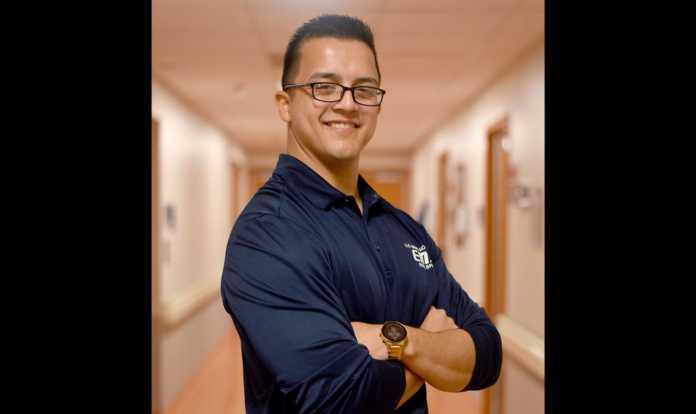Contributed Photo of Israel Pamatz
ROTA, Spain — A 2014 King City High School graduate and King City native is serving in Spain at Naval Hospital Rota in support of ballistic-missile defense ships forward-deployed to Naval Station Rota.
Petty Officer 3rd Class Israel Pamatz is a Navy hospital corpsman working at Naval Hospital Rota and is responsible for health care to all active duty personnel, their families and Department of Defense beneficiaries.
Pamatz credits success in the Navy with lessons learned growing up in King City.
“I learned to stay calm, cool and collected, even in the most stressful of environments,” Pamatz said.
Naval Station Rota is operationally equipped with four forward-deployed Arleigh Burke-class guided-missile destroyers tasked to enhance the ballistic missile defense of the European region.
These four destroyers have a critical NATO mission, specifically to provide full coverage protection for all NATO European populations, territories and forces against the increasing threats posed by the ability to acquire ballistic missiles capabilities.
According to the NATO website, many countries have, or are trying to develop ballistic missiles. The ability to acquire these capabilities does not necessarily mean there is an immediate intent to attack NATO, but that the alliance has a responsibility to take any possible threat into account as part of its core task of collective defense.
Ballistic Missile Defense is a key defensive capability for the U.S., providing protection against the threat of short and medium-range ballistic missile attacks. Stationing four ballistic missile defense ships in Spain provides an umbrella of protection to forward-deployed forces, friends and allies while contributing to a broader defense of the United States.
Situated on a 6,100-acre Spanish Navy base, Naval Station Rota provides cargo, fuel and logistics support to units transiting the region, supporting U.S. and NATO ships; U.S. Navy and U.S. Air Force aircraft with a 670-acre airfield; and the largest weapons and fuels facilities in Europe. Under the guidance of the Agreement on Defense Cooperation (ADC), the U.S. and Spanish navies work together and share many facilities.
The Kingdom of Spain is a very important ally to the United States for projecting military power into the Mediterranean, North Africa and Middle East. The United States has significant shared security interests. Spain has traditionally supported U.S. forces’ deployments and operations, enabling U.S. forces to depart from Spain directly into international air and sea space.
“U.S. Naval Hospital Rota understands the unique demands and challenges that the fleet, forces and families of our community face,” said Capt. Judy Cynthia, commanding officer U.S. Naval Hospital Rota. “We are honored to provide operationally relevant medical care and support that not only meets all of the civilian healthcare quality standards, but is highly specialized and tailored to meet the needs of those we serve.”
Serving in the Navy is a continuing tradition of military service for Pamatz, who has military ties with family members who have previously served. Pamatz is honored to carry on that family tradition.
“I have a lot of family who served in the military,” Pamatz said. “They have guided me throughout my career to make the most out of my service.”
Pamatz is also proud of earning his promotion to petty officer third class and being a corpsman. He has brothers who are a senior chief and chief hospital corpsman.
As a member of one of the U.S. Navy’s most relied upon assets, Pamatz and other servicemembers at Naval Station Rota know they are a part of a legacy that will last beyond their lifetimes providing the Navy the nation needs.
“The Navy has helped me grow a lot in the medical field,” Pamatz said. “I learn a lot each day from our great emergency room team.”
Brian T. Glunt is a Mass Communication Specialist 2nd Class for the Navy Office of Community Outreach.











